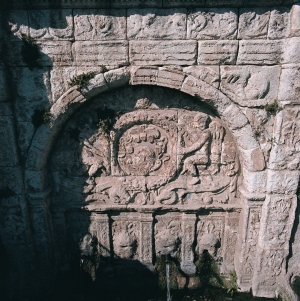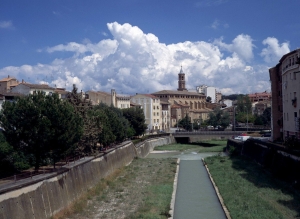San Josemaría was born on 9th January 1902 in the place now occupied by the Centro Entrearcos in Barbastro’s market square. Born into the bosom of a deeply Christian family, he was the second of six children; three of his four sisters died when they were young.
After the bankruptcy of his father’s business the family moved to Logroño and it was here that San Josemaría received his calling and began studying to become a Roman Catholic priest. Following the advice of his father, he also studied for a degree in civil law at the University of Zaragoza. He was ordained a priest on 28th March 1925.
In 1927 he moved to Madrid to study for a Doctorate in Law. During a prayerful retreat, God showed him his mission and eager to do God’s will, he founded Opus Dei on 2nd October 1928. From that day onwards he poured all his efforts into the development of the foundation that had been inspired by God, as well as continuing with his pastoral duties. He was in contact with the poor and the sick on a daily basis through his work in the hospitals and slums of Madrid.
At the break out of the Spanish civil war, Josemaría was still in Madrid and was forced to find refuge wherever he could as a result of religious persecution. He carried out his duties surreptitiously until he was eventually able to leave the city. He crossed the Pyrenees into France and then headed to the Spanish city of Burgos. When the war ended in 1939 he returned to Madrid.
In 1946 he moved to Rome, where he obtained a doctorate in theology from the Lateranense University. He was appointed Consulter to two Vatican Congregations, was made an honorary member of the Pontifical Academy of Theology and made a domestic prelate by the Pope Pius XII. He continued with sessions of the Second Vatican Council and forged intense relationships in many European countries in order to boost the establishment and consolidation of the Opus Dei movement. He also made many trips to the Iberian Peninsula, South America, Mexico and Guatemala between 1970 and 1975 with this same aim.
He died in Rome on 26th June 1975. Thousands of people, including one third of the world’s bishops, solicited the Vatican to begin the process of canonization.
On 17th May 1992, John Paul II beatified Josemaría Escrivá de Balaguer in St Peter’s square in Rome in front of 3000,000 people. His first successor, Monseñor Álvaro del Portillo was present as Opus Dei prelate.
On 20th December 2001, the current prelate Bishop, Javier Echevarría, gave a lecture to the Congregation for the Causes in which he included the miracle performed by San Josemaría, a major step on the road to canonization, which eventually took place on 6th October 2002.At the end of 2001, the Diocese of Barbastro put forward a motion for the construction of a temple in memory of one of the city’s most influential citizens; the first in Spain to be dedicated to the founder of Opus Dei. Barbastro now boasts a magnificent church in his name. The layout is that of a fan, with the altar located at the apex. The shape of the roof is reminiscent of a dove (representing the Holy Spirit) and is crowned by a 31 metre slanting tower, which represents the finger of God. The architect, Heliodoro Dols, used copper to cover the tower and roof to make a reference to divinity.





































